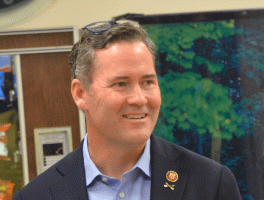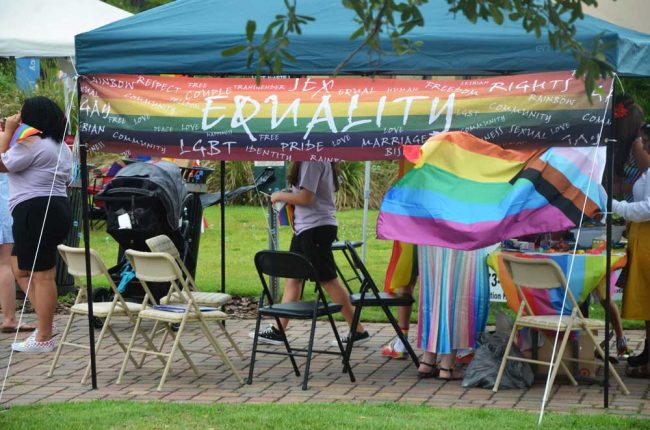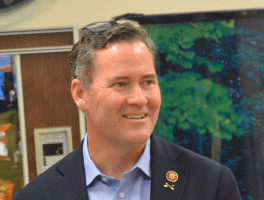Note: you can watch today’s Senate debate and possible vote on the Respect for Marriage Act on C-Span, here, starting at 10 a.m.
The U.S. Senate on Wednesday voted 62 to 37 to move ahead with a historic bill that would give federal protection to same-sex mariage, with 12 Republican senators joining Democrats to overcome the 60-vote threshold for a filibuster.
Both of Florida’s Republican senators, Marco Rubio and Rick Scott, voted against the measure.
The cloture vote was a key step to enact the Respect for Marriage Act, which would repeal the 1996 Defense of Marriage Act and ensure respect for State regulation of marriage. A vote on the measure itself is scheduled for today, with debate on the bill resuming this morning. Passage would signal a rare instance of bi-partisanship in a riven Congress and result in an extraordinary milestone for same-sex marriage in the United States.
The U.S, Supreme Court ruled the Defense of Marriage Act unconstitutional in 2013, essentially legalizing gay marriage. But proponents and defenders of gay marriage were concerned by signals from a more conservative Supreme Court that the precedent could be overturned the way Roe v. Wade was last June.
U.S. Rep. Jerrold Nadler, a New York Democrat and one of the House’s more liberal members, introduced the Respect for Marriage Act in mid-July. The measure, H.R.8404, cleared the House on July 19 on a 267-157 vote. In a surprise, 47 Republicans joined 220 Democrats, giving life to a bill that had been considered dead on arrival because of an evenly split Senate.
Among the surprises: Rep. Mike Waltz, the Republican who represents Flagler County, was among the six Florida Republicans breaking with their colleagues to vote for it.

(© FlaglerLive)
The move among many Republicans to support same-sex marriage reflects a momentous shift in public opinion. According Gallup polling, only 27 percent of respondents agreed in 1996 that same-sex marriage should be recognized by law as equally as “traditional” marriage. That was the year when the Republican-majority Congress passed–and Bill Clinton signed–the Defense of Marriage Act, which allowed states not to recognize gay marriages from other states. (In March 2013, as the Supreme Court was considering that law, Clinton in an OpEd in the Washington Post admitted his mistake and posed the question before the justices: “whether it is consistent with the principles of a nation that honors freedom, equality and justice above all, and is therefore constitutional. As the president who signed the act into law, I have come to believe that DOMA is contrary to those principles and, in fact, incompatible with our Constitution.”)
Well before the Supreme Court’s 5-4 decision for legalization, public opinion was moving in favor of same-sex marriage, with approval–according to Gallup–rising past the 50 percent mark before the court’s decision and rising more rapidly after that. In May, approval stood at 71 percent, a record. “Rising national support for legal same-sex marriage reflects steady increases among most subgroups of the population, even those who have traditionally been the most resistant to gay marriage,” Gallup reported. “Adults aged 65 and older, for example, became mostly supportive in 2016 — as did Protestants in 2017 and Republicans in 2021.” The holdouts were regular church-goers, among whom only 40 percent are in support, compared to 82 percent for those who never attend church.
The measure itself must now win Senate passage, then return to the House for another vote before going to President Joe Biden for his signature.
Rubio called the bill a “waste of our time on a non-issue” when asked about it by a reporter in July. “States decide marriage laws, they always have,” he told Business Insider. “It’s why you can get married in Las Vegas by an Elvis impersonator in two hours.” Rubio is on the right wing of the Republican Party, with Scott further to the right.
In a statement issued on Wednesday, Scott explained his No vote this way: ““I proudly support the gay community in Florida and across the nation and will aggressively fight any attempt to take away the ability for same-sex couples to marry and live their dreams in our great country. Unfortunately, the bill under consideration by the U.S. Senate does not adequately protect the religious liberties of all Americans, as guaranteed by the Constitution.”
Scott and Rubio are supportive of an amendment to the bill by Utah Republican Mike Lee he calls the “First Amendment Defense Act,” originally introduced in 2015. The amendment allows individuals to define marriage as only the union or a woman and a man, would allow those individuals to act accordingly and discriminate against those who don’t follow that definition–by, for example, denying service to gay couples–and would prohibit the federal government from taking action against such discrimination. The amendment, in sum, legalizes discrimination as long as it is in accordance with religious or moral beliefs.
“What an individual or organization believes about the traditional definition of marriage is not – and should never be – a part of the government’s decision-making process when distributing licenses, accreditations, or grants,” Lee said of the Act in 2018. “And the First Amendment Defense Act simply ensures that this will always be true in America – that federal bureaucrats will never have the authority to require those who believe in the traditional definition of marriage to choose between their living in accordance with those beliefs and maintaining their occupation or their tax status.”
The ACLU says the “disingenuously titled” bill “would open the door to unprecedented taxpayer-funded discrimination against LGBT people, single mothers, and unmarried couples.”
![]()
![]()









